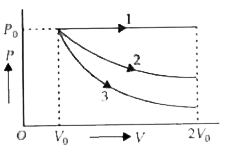Which is always false for isothermal process (A) W≠0, (B) ΔU≠0, (C) ΔT=0, (D) q=0
Step by step video & image solution for Which is always false for isothermal process "(A) "W!=0, "(B) "Delta U!=0, " (C) "Delta T=0, " (D) "q=0 by Chemistry experts to help you in doubts & scoring excellent marks in Class 11 exams.
Similar Questions
Which of the following is are true in the case of an adiabatic process(A)q=W, (B)ΔU=q, (C)q=0, (D)ΔU=W
View SolutionA sample of liquid in a thermally insulated container is stirred to increase the temperature.For this process (A) w<0;q=0;ΔU,=0, (B) w>0;q>0;ΔU>0], (c) w<0;q>0;ΔU,=0, (D) w>0;q=0;ΔU>0
View Solution
Knowledge Check
- Question 1 - Select One
ΔU=0 for
ACyclic process, Adiabatic processBIsothermal, Adiabatic processCCyclic process, Isothermal processDIsochoric process, Isothermal process - Question 2 - Select One or More
ΔE=0 for which process
ACyclic processBIsothermal expansionCIsochoric processDAdiabatic process - Question 3 - Select One
ΔE=0, for which process :-
ACyclic processBIsobaric processCIoschoric processDAdiabatic process
For the process to occur under adiabatic conditions, the correct condition is
View SolutionFor a cyclic process,the condition is (A) ΔU=0 only (B) ΔH=0 only (C) ΔU>0 and ΔH>0 (D) both ΔU=0 and ΔH=0
View SolutionCorrect relation for isothermal reversible expansion of an ideal gas is
ΔS=0
ΔG=−TΔS
ΔH≠0
ΔU≠0View SolutionA gas is expanded from volume V0 to 2V0 under three different processes, as shown in the figure. Process 1 is isobaric process, process 2 is isothermal and process 3 is adiabatic. Let ΔU1,ΔU2 and ΔU3 be the change in internal energy of the gas in these three processes. Then
 View Solution
View SolutionOut of the following one which is correct for equilibrium state ?
(a) ΔG=0 (b) ΔS=0 (c ) rf=rb (d) Ecell=0View Solution
